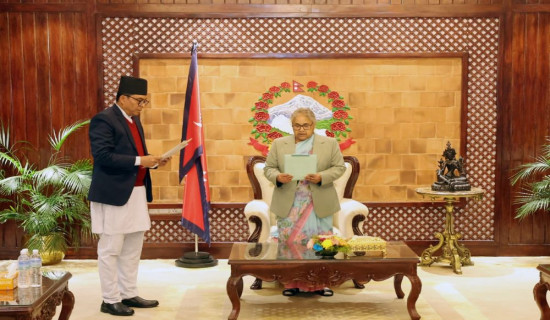- Tuesday, 16 December 2025
Buddhi Bahadur Pariyar: The creator of timeless song remains neglected
By Phadindra Adhikari,Lekhanath, May 8: Walking alone for two hours to Sarangkot from Bindhyabasini was his routine when Buddhi Bahadur Pariyar was young. He used to walk barefoot enjoying the enchanting sight of birds and insects dancing through the air. No matter whether he was hungry and tired while ascending to Sarangkot or descending to Pokhara, Pariyar used to hum the timeless tune of ‘Resham Firiri Resham Firiri’, which he created himself.
Finally, the timeless song ‘Resham Firiri Resham Firiri’ was born in 1972, and recorded two years later in 1974.
Immediately after its recording, the song became a conduit for introducing Nepali songs and music to the world. It hung on the lips of Nepalis and foreigners alike, but its creator, Buddhi Bahadur Pariyar, remained in obscurity.
Nowadays, any enthusiast of Nepali music learns to sing and play this song from the outset. It has become an enduring, ubiquitous anthem of Nepali music.
Despite this, the life of its creator was perennially overlooked and wrapped in sorrow.
On the 21st Memorial Day on Sunday, the people of Pokhara paid tribute to Pariyar. On the occasion, ‘Buddhi Pariyar Smriti Grantha’, published by Samanantar Sahitya Literary Manch, was also unveiled.
Phewa Lake rendered Pariyar an orphan at the tender age of nine when his father tragically drowned while fishing, and his mother died six months after the tragedy.
Pariyar’s peers recall his prolonged period of desolation after losing his parents.
He fell in love with Dhanmaya, with whom he performed peacock dances, folk dances, and Kauda.
It is Dhanmaya, an educated girl, who has diligently documented the life of the creator of the famous song.
The couple bore four children, among whom, their son Dharmendra Sewan, has emerged as a notable singer.
Sewan said, “I aim to forge my own identity inspired by my father’s struggles.”
Pariyar’s renowned compositions such as ‘Herda Ramro Machhapuchchhre’, ‘Talwari Basau Chhal Pari’, ‘Saiko Ghar Kaha Ho Kaha, and ‘Sarar Yo Man Dharar’ resound widely.
Despite enduring numerous hardships, Pariyar continued his career as a song composer and singer.
Pariyar’s sole collaboration with Sundar Shrestha resulted in the recording of ‘Pokhrako Bazaar’.
Notable singers including Kumar Basnet, Gyanu Rana, Tirtha Kumari and Kalyan Sherchan have lent their voices in his lyrics.
Pariyar not only excelled as a dancer, singer, and songwriter but also served as a dance instructor.
His captivating peacock dance won the admiration of late King Birendra and Queen Aishwarya, and got a chance to serve in the Nepal Police for two decades.
Impressed by his peacock dance, the late Queen Aishwarya gave him Rs. 11,111 as a prize in 1972.
Culture activist Tirtha Shrestha recalls Pariyar’s unparalleled energy, stating, “I had the privilege of witnessing his dance, his vigour was unmatched.”
Despite his artistic prowess, Pariyar struggled with financial problem, leading to a life fraught with ups and downs.
He was so poor that his family members had to seek support to perform his rites. He breathed his last on the morning of May 6, 2003, but his family managed to take his body to the crematory only in the evening because of poverty.
The songwriter, singer and dancer was never honoured by the government during his lifetime or even after his demise, recalled his friends.
Writer Sarubhakta recalled Pariyar’s enduring contributions amidst the ebb and flow of folk life, stating, “Pariar was an exceptional artist, yet his greatness remained unrecognised during his lifetime and even after his death.”
















